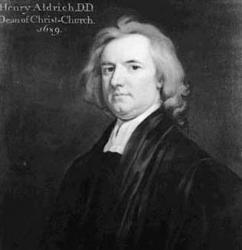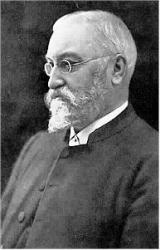Planning worship?
Check out our sister site, ZeteoSearch.org,
for 20+ additional resources related to your search.
- |
User Links
Person Results
William Felton
1715 - 1769 Person Name: W. Felton, 1715 - 1769 Composer of "[Lord, now lettest thou thy servant depart in peace] (Felton)" in The Hymnary for use in Baptist churches
William Felton
Henry Aldrich

1647 - 1710 Person Name: Dr. Aldrich Composer of "[Lord, now lettest thou thy servant]" in The Hymnal, Revised and Enlarged, as adopted by the General Convention of the Protestant Episcopal Church in the United States of America in the year of our Lord 1892 Henry Aldrich, an English composer, born 1657; died 1710; his library is at Oxford College.
A Dictionary of Musical Information by John W. Moore, Boston: Oliver, Ditson & Company, 1876
Henry Aldrich
Philip Humphreys
b. 1935 Person Name: Humphreys Composer of "[Lord, now lettest thou thy servant depart in peace]" in Columbia University Hymnal
Philip Humphreys
Lewis Thomas Downes
1827 - 1907 Person Name: Lewis Thomas Downes, 1827 - 1907 Composer of "[Lord, now lettest thou thy servant depart in peace] (Downes)" in The Hymnary for use in Baptist churches
Lewis Thomas Downes
Edward Hodges

1796 - 1867 Person Name: Dr. Hodges Composer of "[Lord, now lettest thou thy servant]" in The Hymnal, Revised and Enlarged, as adopted by the General Convention of the Protestant Episcopal Church in the United States of America in the year of our Lord 1892 Born: July 20, 1796, Bristol, England.
Died: September 1, 1867, Clifton, Bristol, England.
Buried: Church of St. Mary the Virgin, Stanton Drew (about eight miles south of Bristol).
Hodges’ musical gift showed itself at an early age; by 1819, he was playing the organ at St. James’ Church in Bristol, and at St. Nicholas’, 1821-1838. He also had an interesting mechanical bent, and spurred several technical improvements in organ design. He composed a number of services and anthem pieces, and Cambridge University awarded him a doctorate in music in 1825.
Hodges eventually emigrated, accepting a post at the cathedral in Toronto, Canada, in 1838. The next year, he became music director at Trinity Parish in New York City. He became the organist at Trinity Church when it opened in 1846 (the church had its organ built to his specifications). He retired for health reasons in 1859, and returned to his native England in 1863. Hodges’ works include:
An Apology for Church Music and Musical Festivals, in Answer…to the Standard and the Record (London: 1834)
Essays on the Objects of Musical Study (Bristol, England: 1838)
An Essay on the Cultivation of Church Music (New York: 1841)
Contributions to the Quarterly Musical Magazine & Musical World
Trinity Collection of Church Music (Boston, Massachusetts: 1864) (editor)
Music--
BRISTOL
GLOUCESTER
HABAKKUK
HYMN TO JOY
--www.hymntime.com/
Edward Hodges
George Black
1931 - 2003 Person Name: George Black, 1931- Composer of "[Lord, now you let your servant go in peace]" in Common Praise (1998)
George Black
Louis Spohr
1784 - 1859 Person Name: Spohr Composer of "[Lord, now lettest thou thy servant] (Stainer)" in The Church Hymnal Also:
Spohr, Ludwig, 1784-1859
Shpor, Lui, 1784-1859
Spohr, L. (Louis), 1784-1859
Shpor, Ludvig, 1784-1859
Spohr, Ludewig, 1784-1859
Louis Spohr
Ethelbert W. Bullinger

1837 - 1913 Person Name: E. W. Bullinger Composer of "[Lord, now lettest thou thy servant] (Bullinger)" in The Church Hymnal Ethelbert William Bullinger DD United Kingdom 1837-1913. Born in Canterbury, he was an Anglican clergyman, Biblical scholar, and ultradispensationalist theologian and writer. Educated at King's College, London, he became a good organist, singer, and composer. He married Emma Dobson, 13 years his senior, and they had two sons. In 1861 he began as Associate Curate to the parish of St. Mary Magdelene, Bermondsey, and was ordained as priest in the Church of England in 1862. He served as parish curate in Tittleshall until 1866, then Notting Hill until 1869, them Leytonstone to 1870, and finally Walthamstow, until becoming Vicar of the new parish of St. Stephen's in 1874. He resigned his vicarage in 1888. In 1867 he was clerical secretary of the Trinitarian Bible Society, which he held (except for illnesses) until his death. The Society completed and published a Hebrew version of the New Testament, the Tanakh (introduction to the Hebrew Bible), formation of the Brittany evangelical Mission Society under Pasteur LeCoat and translation of the Bible into Breton, also producing the first ever Protestant Portuguese reference Bible. It also distributed Spanish Bibles in Spain after the 1868 Spanish Revolution. Bullinger, a practiced musician, collected and harmonized untranscribed hymns on his visits to Tremel, Brittany. He wrote many articles, edited a monthly journal “Things to come”. He wrote 4 Biblical works (16 works).
John Perry
Ethelbert W. Bullinger
Stephen Elvey
1805 - 1860 Person Name: Stephen Elvey (1805-1860 Composer of "[Lord, now lettest thou thy servant depart in peace]" in The Pilgrim Hymnal
Stephen Elvey
Walter Bond Gilbert

1829 - 1910 Person Name: Dr. W. B. Gilbert Composer of "[Lord, now lettest thou thy servant]" in The Hymnal, Revised and Enlarged, as adopted by the General Convention of the Protestant Episcopal Church in the United States of America in the year of our Lord 1892 Walter Bond Gilbert DMus United Kingdom 1829-1910. Born at Exeter, Devon, England, he studied music under Alfred Angel, Samuel Wesley and Henry Bishop. He attended New College, Oxford and the University of Toronto, Canada. He was organist in Devon at Topsham in 1847, Bideford in 1849, Kent at Tonbridge in 1854, Old Colliegiate Church, Maidstone in 1859, Lee in 1866, Boston, Lincolnshirein 1868, and Trinity Chapel in New York City in 1869-1897. He taught music at Tonbridge School, helped found the College of Organists, edited the America Episcopal Hymnal, and wrote a number of monographs, including “Antiquities of Maidstone”. He continued to write church music, producing services, oratorios (including “The Restoration of Israel and St. John, 1857), organ works, and anthems. He died at Headington, Oxford, England.
John Perry
Walter Bond Gilbert


 My Starred Hymns
My Starred Hymns


